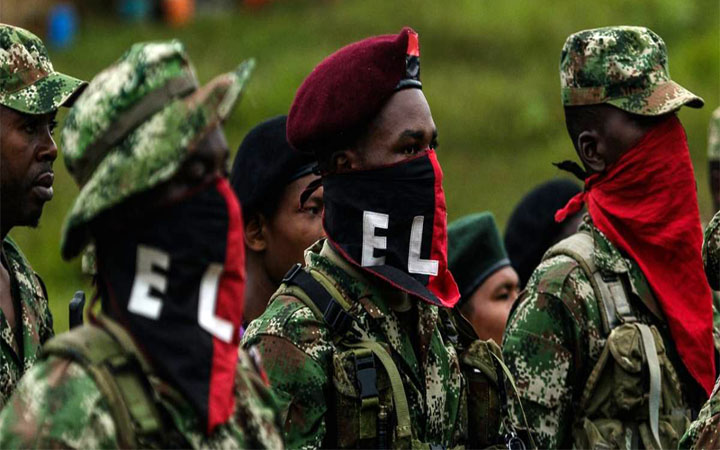 Bomb attack on police station and ‘armed strike’ puts country on alert after suspension of bilateral ceasefire immediately leads to renewed hostilities.
Bomb attack on police station and ‘armed strike’ puts country on alert after suspension of bilateral ceasefire immediately leads to renewed hostilities.
This month marked the first anniversary of peace talks between the government and the country’s last major guerrilla organisation, the ELN. Several attempts to initiate negotiations sooner had failed because of the rebel group’s refusal to end their practice of kidnapping. The release of a key hostage, congressman Odín Sánchez, finally paved the way for both sides to sit down and agree on a six-point agenda covering a broad range of topics, including the insurgency’s demand for participation of civil society in the peace process.
One year on, however, and peace with the ELN seems elusive at best. In a historic first, the negotiating parties reached a deal on a two-month bilateral ceasefire, but violence flared up just hours after its expiration on January 10, as the rebel group staged several attacks on oil pipelines and a naval base in the eastern Arauca province.
Hopes for progress in the negotiations further diminished when the guerrilla exploded bombs on three police stations nationwide, leaving seven officers dead. More recently, the ELN announced a three-day ‘armed strike’ from February 10 to 13. The offensive kicked off with several explosive attacks on road infrastructure and vehicles in the provinces of Cesar, Norte de Santander, Antioquia and Arauca. Two bomb explosions on major highways in the northern part of the country left the region disconnected from the capital Bogotá. In the meantime, President Santos has suspended the upcoming fifth round of talks, demanding “coherence between the ELN’s words and its actions.”
The ELN is not the FARC
The guerrilla group has justified its hostilities by citing what it describes as non-compliance on the part of the government with some of its key demands. According to the rebel group, the Santos administration has failed to stop the killings of social leaders across the country and has done little to improve the humanitarian situation of imprisoned ELN combatants.
Despite these tensions, one might think that peace should be feasible. After all, a comprehensive peace agreement with the FARC has already been sealed, leading to its demobilisation and transformation into a political party.
However, the slow pace and difficulties in implementing this deal are becoming more and more apparent to the ELN. In addition, there are significant ideological and structural differences between the two guerrilla organisations that impede one-size-fits-all models for peace.
Related: Bombings on a police station hit Northern Colombia
For one thing, the ELN has abandoned its plans of seizing power in Colombia and instead focuses on a strategy of “armed resistance” against the state and multinational businesses. Applying such armed resistance while at the same time entering peace talks with the government is extremely contradictory and partly explains the guerrilla organisation’s incoherent behaviour.
At the same time, there are several radical factions within the ELN that still don’t believe in the peace process. In fact, its hierarchical structures are much less clearly defined than the FARC’s – some of its fronts have acted independently, making it difficult to predict their actions and guarantee a basic level of trust among the negotiating parties.
Is there a way out of the crisis?
Given this situation, it will not be easy to overcome the current crisis of the peace talks. Former ELN commander and adviser to the peace talks, Carlos Velandia, has called on the parties to continue negotiating. “This isn’t just about the fifth round of talks, what’s at stake is the viability of the peace negotiations as a whole,” he stated in an interview.
Senior analyst with International Crisis Group, Kyle Johnson, agrees that peace talks are at high risk of collapsing. Nevertheless, he notes that there is still a “consensus that this crisis can be overcome” if “the ELN realises that its bid for social participation in the peace talks actually depends on the cessation of its hostilities.”
Finally, it is worth noting that the population living in ELN strongholds greatly benefited from an improved humanitarian situation during the bilateral ceasefire. The international community and local human rights groups have already relayed this message to the negotiating parties. Peace and social activists are in a good position to continue exerting this kind of pressure on behalf of vulnerable communities – especially seeing as it is civil society the ELN claims to defend.





